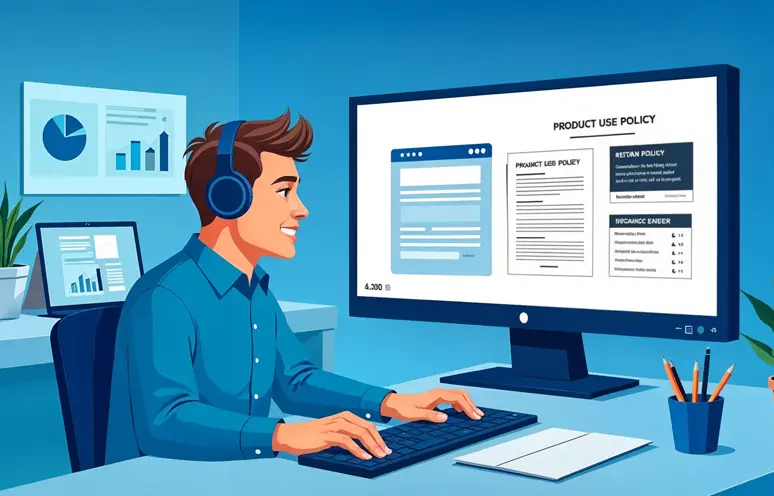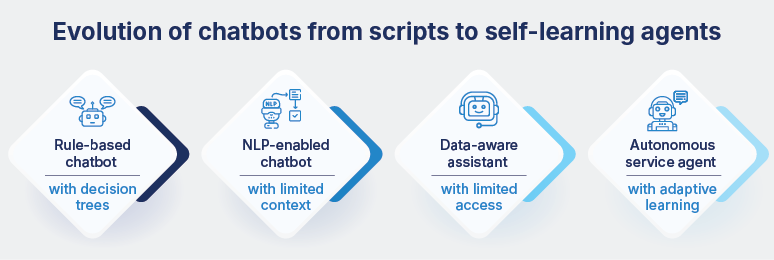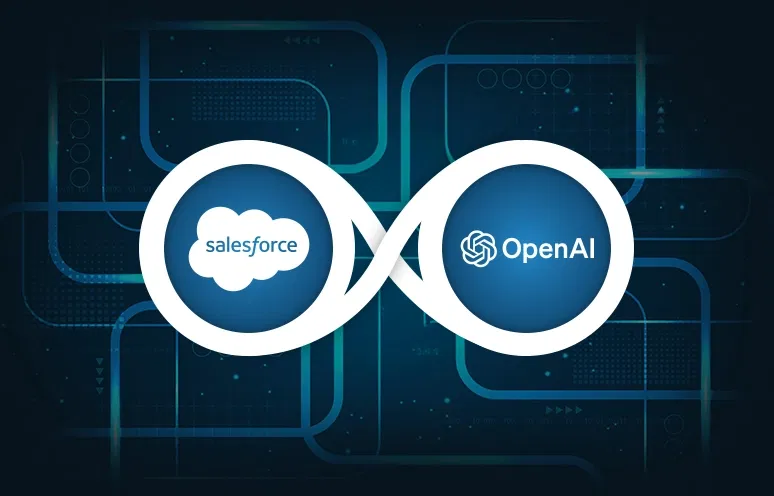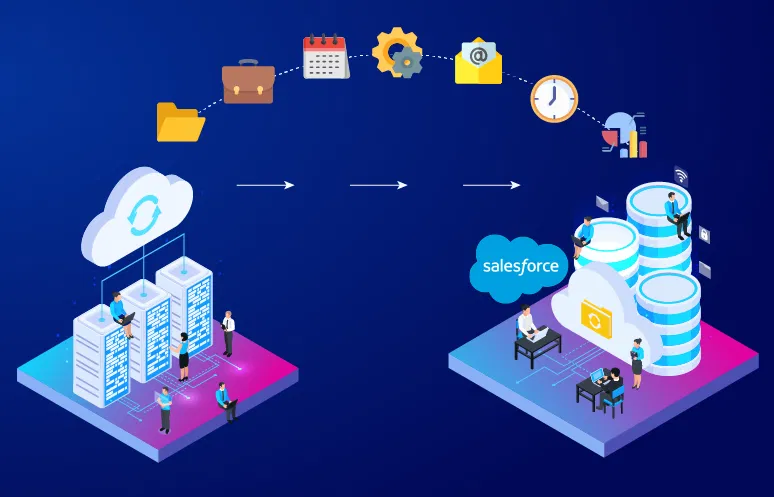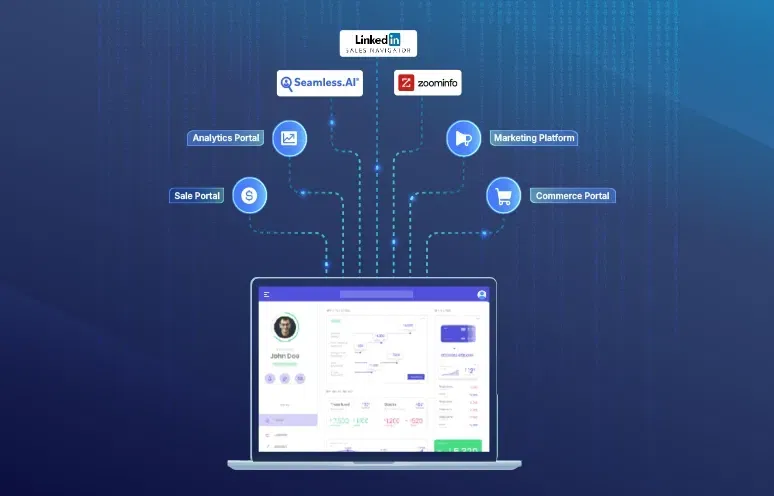Most brands used to keep a close eye on sales numbers, marketing performance, and other parts of the business that generate revenue. However, customer support activities often lacked similar attention for two reasons. First, it was not easy to quantify the impact of customer service on revenue. And second, customers once had fewer choices, so they would visit a store, make a purchase, and continue with their lives.
Now, customers have multiple options before making a purchase and talking about their experiences. The customer experience has become a deciding factor. Suppose you want to deliver service experiences that are personalized, proactive, and easier for the person on the other end. In that case, you need to power user experiences through Artificial Intelligence (AI) technology, particularly through service agents, a type of AI agent.
Unlike the scripted bots of the past, AI agents are bots that are built with the purpose of human connection. They are designed to understand the nuances of CX and fully resolve complex issues.
Through this blog post, understand what a service agent is, types of service agents, five ways through which service agents enhance the user experience, Agentforce service agent use cases, and how it is different from Einstein bots.
Understanding Salesforce Agentforce Service Agent
Agentforce service agents are Salesforce’s AI-powered customer service solution. They combine natural language processing with predictive analytics. Deep CRM integration enables complex customer interactions. These autonomous agents resolve issues proactively. They learn continuously from every engagement. Service quality improves through operational efficiency gains.
Unlike traditional rule-based systems, Agentforce agents understand the context. They access real-time Salesforce data instantly. This enables them to provide personalized experiences through dynamic responses. The seamless integration with existing Salesforce infrastructure also enables scaling, ensuring that every customer feels valued and understood.
Traditional chatbots often create operational challenges for enterprises. They fail to retain context across conversations, leading to fragmented experiences. Manual rule configurations consume significant time and resources. Even simple issues frequently escalate to human agents, causing unnecessary delays. Such limitations create bottlenecks that frustrate customers and overwhelm service teams with repetitive tasks.
Evolution of customer support with the rise of autonomous service agent
Traditional chatbots emerged as simple rule-based systems. They were designed to handle frequently asked questions through decision trees. These early solutions provided basic deflection capabilities but lacked contextual awareness. Rigid responses often frustrated customers, and frequent escalations to human agents occurred.
The evolution continued with the integration of Natural Language Processing (NLP). The ability enables chatbots to understand the intent and provide more conversational interactions. However, comprehensive access to customer data remained limited. Learning from interactions proved challenging. Complex scenarios requiring multi-step resolution failed. Adaptation capabilities remained severely constrained.
Agentforce service agent represents the culmination of this evolutionary journey. It combines advanced AI with deep CRM integration to power autonomous decision-making. These systems proactively identify and understand customer needs, access complete interaction histories, and execute complex workflows while continuously improving through the use of machine learning algorithms.
Types of Salesforce Agentforce service agents
Salesforce offers six distinct agent types. Each addresses specific business functions. Such a diversified approach enables organizations to deploy targeted AI solutions across multiple departments and customer touchpoints, thereby enhancing their overall effectiveness.
| Agent type | Primary function | Key capability | Business impact |
|---|---|---|---|
| Agent for setup | System configuration automation | Streamlines initial deployment processes | Reduces implementation time |
| Employee agent | Internal support automation | Handles HR, IT, and operational queries | Improves employee satisfaction scores |
| Sales coach | Revenue team performance optimization | Provides real-time guidance and insights | Increases conversion rates |
| SDR | Lead qualification and outreach | Automates prospecting and initial contact | Generates more qualified leads |
| Service agent | Customer support automation | Resolves complex service interactions | Reduces resolution time |
| Service assistant | Agent productivity enhancement | Augments human capabilities with AI insights | Improves first-call resolution rates |
Agent for setup
It streamlines system configuration through intelligent automation and guided workflows. It reduces deployment complexity by automating technical configurations and ensuring consistent implementation standards across all systems. The agent accelerates time-to-value by minimizing manual setup requirements and reducing potential configuration errors. Organizations achieve faster go-live timelines and improved system reliability through standardized deployment processes.
Employee agent
This type of service agent transforms internal support by autonomously handling HR inquiries, IT requests, and operational questions. It provides instant responses to policy questions, automates routine requests, and escalates complex issues appropriately. The agent reduces internal support ticket volume while improving employee satisfaction through immediate assistance. Companies experience decreased HR workload and enhanced employee productivity through self-service capabilities.
Sales coach
A sales coach enhances revenue team performance through real-time guidance, opportunity insights, and behavioral recommendations. It analyzes deal progression patterns, suggests optimal engagement strategies, and provides competitive intelligence during active negotiations. The agent increases conversion rates by delivering contextual coaching at critical decision points. Sales organizations achieve higher quota attainment and improved deal velocity through AI-powered performance optimization.
Sales Development Representative (SDR)
SDR agent automates lead qualification, outreach campaigns, and initial prospect engagement activities. It identifies high-potential leads through predictive scoring, personalizes communication sequences, and automatically schedules qualified meetings. The agent generates more qualified opportunities while reducing manual prospecting time and effort. Marketing and sales teams experience improved lead conversion rates and accelerated pipeline development.
Service agent
Service agent handles complex customer support interactions through natural language understanding and comprehensive issue resolution capabilities. It accesses complete customer histories, accurately diagnoses problems, and autonomously executes multi-step resolution workflows. The agent reduces average resolution time while maintaining high customer satisfaction scores. It also supports organizations to achieve improved operational efficiency and enhanced customer experience delivery.
Service assistant
These assistants augment human agent capabilities through real-time insights, suggested responses, and automated workflow assistance. It provides contextual information during customer interactions, recommends optimal resolution paths, and handles administrative tasks seamlessly. The agent improves first-call resolution rates while reducing agent training requirements and onboarding time. Customer service teams experience enhanced productivity and improved service quality through the use of AI-powered assistance.
Five ways Agentforce Service Agent improves the customer experience
Customer service excellence is a key determinant of business success today. Organizations must deliver consistent, personalized experiences while managing operational costs and maintaining service quality standards.
Unified customer view
Fragmented customer data across multiple systems creates incomplete interaction contexts and inconsistent service experiences. Agentforce service agents integrate all customer touchpoints, purchase history, support interactions, and preference data into comprehensive profiles. As a result, enhanced personalization capabilities emerge naturally. First-call resolution rates improve through context. Customer satisfaction increases through complete visibility.
Automating processes with AI Agents
Manual service processes create delays, inconsistencies, and resource constraints that impact customer experience and operational efficiency. Service agents automatically handle routine inquiries, process standard requests, and execute complex workflows. Organizations can achieve reduced response times, improved service consistency, and enhanced operational efficiency through process automation with AI agents.
User-friendly interfaces
Complex service interfaces and navigation challenges make the flow difficult for customers and create barriers to self-service adoption. Agentforce addresses this with intuitive conversational interfaces that naturally adapt to user preferences and communication styles. As a result, the experience becomes simpler, driving higher user engagement. And improved accessibility leads to greater self-service adoption. Overall, streamlined interactions translate into higher customer satisfaction.
Quick deployment and see AI agent in action
Lengthy implementation cycles delay the realization of value and increase organizational resistance to the adoption of new technology. Service agents deploy rapidly through pre-configured templates, automated setup processes, and seamless Salesforce integration capabilities. Thus, organizations can experience faster time-to-value, reduced implementation costs, and immediate operational improvements through accelerated deployment timelines.
Grounded in trusted data
Inaccurate or outdated information undermines customer confidence and creates inconsistencies in service delivery across channels. Agentforce service agents access real-time Salesforce data, maintain information accuracy and provide consistent responses across all customer touchpoints. Access to reliable, up-to-date information results in enhanced customer trust, improved service quality, and reduced error rates.
What are the differences between service agent and Einstein Bots
Einstein Bots offer valuable automation capabilities through rule-based decision trees and basic natural language processing, enabling them to handle common customer inquiries. These solutions provided deflection benefits by handling routine questions, collecting initial customer information, and routing complex issues to human agents when predetermined conditions were met.
Agentforce service agents transcend Einstein Bots’ limitations through autonomous decision-making capabilities and deep learning integration. While Einstein Bots follow scripted workflows, service agents adapt dynamically to unique customer situations and execute complex resolution processes independently.
Einstein Bots require extensive manual configuration and rule maintenance, whereas service agents learn continuously from interactions and improve automatically. Traditional bots often escalate to human agents, while service agents resolve complex issues autonomously through comprehensive data access and advanced reasoning capabilities.
Curious how Agentforce can transform your customer service journey?
Connect with our Agentforce specialists to explore strategies that streamline service operations, boost customer satisfaction, and align with your unique business goals.
What you can do to transform your service operations today
Agentforce service agents represent the definitive evolution from reactive support models to intelligent, proactive delivery of customer experiences. Organizations implementing these AI-powered solutions achieve measurable improvements in customer satisfaction, operational efficiency, and service quality while reducing costs and scaling effectively across growing customer bases.
Connect with our certified Salesforce experts to develop a customized Agentforce implementation strategy tailored to your business requirements. We align the solution with your operational goals and customer experience objectives to deliver immediate and sustained competitive advantage.
FAQs
1. How does Agentforce improve customer satisfaction and engagement?
Agentforce enhances customer experience by offering 24/7 instant support through AI-powered conversations. Its large language models understand context, maintain brand tone, and access real-time enterprise data across formats like chat logs, PDFs, and documents. This creates more personalized interactions, leading to higher satisfaction rates and deeper engagement across all customer touchpoints.
2. What AI features in Agentforce help service agents work more efficiently?
Agentforce uses agentic AI that can plan, reason, and act with or without human input. It processes multiple data sources simultaneously, including customer profiles, purchase history, and interaction logs, enabling agents to automate workflows, make informed decisions, and provide personalized recommendations. Its reasoning engine reduces manual effort and improves decision quality through predictive analytics.
3. Is Agentforce suitable for both small and large customer service teams?
Yes, Agentforce is designed on a scalable distributed architecture that caters to organizations of any size. Small teams can leverage its automated routine inquiries and processes without the need for extensive technical resources, while large enterprises can manage thousands of concurrent interactions. The modular design ensures that teams can start with basic implementations and gradually expand functionality as they grow, making it a future-proof solution that adapts to your organization’s evolving needs.
4. Can Agentforce be customized for industry-specific service needs?
Definitely. Agentforce offers fully customizable autonomous AI agents that can connect to any enterprise data and integrate with external systems and third-party applications. With the help of NLP, organizations can configure industry-specific workflows, terminologies, and compliance requirements without extensive coding. Whether it’s healthcare compliance, financial services regulations, or manufacturing standards, Agentforce empowers you to adapt to your industry’s unique context while maintaining data security and governance standards.
5. What kind of analytics and reporting does Agentforce provide to service managers?
Agentforce provides real-time analytics, including agent performance metrics, customer interaction patterns, sentiment analysis, and resolution rates. Managers can access customizable dashboards, automated alerts, and trend analysis to make informed decisions. Its analytics engine processes structured and unstructured data to provide insights into customer behavior, agent efficiency, and service quality metrics, helping managers optimize team performance and improve customer experience outcomes.
